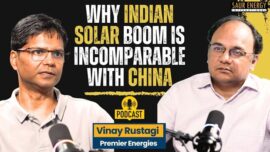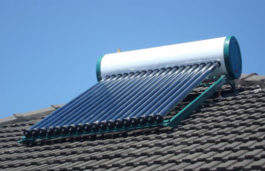
After his resounding victory in the assembly polls, this is one promise industry wishes new CM YS Jaganmohan Reddy wouldn’t keep. But to the alarm of many, the Chief Minister seems to be serious about his threat to relook all the previous tenders, including solar and wind energy tenders, signed by the previous government, especially post 2016.

Jaganmohan Reddy’s grouse has been that the prices are artificially high due to corruption and hence there is a case for renegotiation. A contention he makes despite the fact that an auction process was followed, and rates agreed to have the approval of both state and central authorities. In fact, the centre had actually moved to limit any damage from the CM’s announcements by writing to the AP government with a clear message to honour the PPA contracts signed earlier.
The answer from the Andhra state government has been a high-level negotiation committee constituted to review and renegotiate the signed power purchase agreements (PPAs) with wind and solar power developers. As of now, it seems that all contracts with prices above the range of Rs 2.50 to Rs 2.60 might be up for a relook. Irrespective of the final outcome of the this committee’s investigations, the fact remains that this has already started damaging the prospects of developers at both state and national level.
PPA’s are the equivalent of the sacred book for developers, with projects only moving forward on the basis of PPA’s signed. The agreement is the key that unlocks financing, vendor financing, and everything else that goes into a project. Which explains why any hint of renegotiating those is taken seriously. Globally, whenever countries have threatened to do the same, the results have almost never been good for the side reneging on the ‘deal’.
Raters like India Ratings and Research (Fitch Group), have already rung the alarm bells, pointing to the much higher risk of portfolio degradation thanks to further delays in payments this situation will lead to. Typically, payments are held back whenever a government committee is entering into price negotiations, or renegotiations in this case. With an average delay of eight months already being carried by developers, this puts them in a very poor financial situation.
It is also likely to send a stark message to the bidders of future auctions, as the sad fact of payment delays, and now contract renegotiations on top, take the centrestage.
For the firms involved, this is the equivalent of a force majeure risk as new governments tearing up old contracts, or sitting on payments while they renegotiate, is hardly the sort of risk most factored in while bidding in tight auctions. Bidders might argue that what is the point of democracy and rule of law if this is what they have to face after investing in the state. At least 2 of the 5 players we spoke to believe that the CM has either been misled, misinformed or has miscalculated the response of the centre to his moves.
Andhra Pradesh, as a leading renewable energy state, has over 7,700 MW of solar and wind projects. That is close to 12% of the national total and any serious issues here are likely to impact the mood nationally. In a sector already hamstrung by a funding crunch, this move is only going to make things worse, and make financiers wary of large projects.
Cash strapped Discoms, with low to no incentives for buying renewal power, have never been an industry favourite with Discoms in states like Karnataka, Uttar Pradesh, Gujarat and Madhya Pradesh, besides Andhra Pradesh under the previous Naidu government, making failed attempts to renegotiate tariffs.
Even as industry players we spoke to refused to come on record, the view was unanimous that there is no silver lining in this for the sector. While negotiations and the payment delays will lead to further erosion of margins and stress, even a positive outcome by way of clearing the previous PPA’s is unlikely to speed up future investments in Andhra. Worse, any unfavourable outcome will only start a long and expensive process for redressal, and is guaranteed to impact bidding across projects in the future.
Andhra Pradesh incidentally is the state that single handedly spiked the micro finance industry when the state government virtually told borrowers in the state to stop repayments. It was a blow that the MFI industry took years to recover from. The question is, just what is the best damage control that the central government can do to limit the aftershocks caused by the decision of Andhra government? An even bigger role for SECI seems to be the only obvious way out for now, though even SECI can only give an assurance for payments; for actual project execution and generation state level cooperation is critical.

























